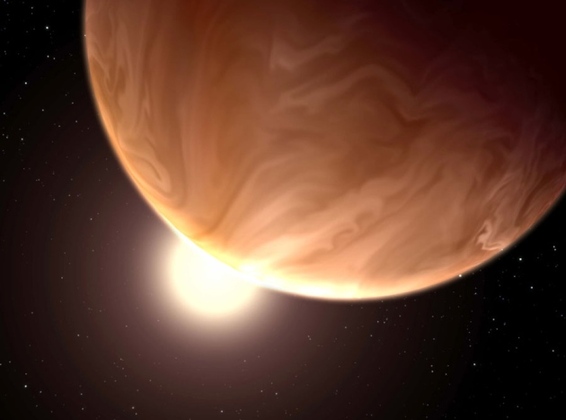First ever weather forecast for alien 'super-Earth'
China.org.cn/Chinagate.cn, January 2, 2014 Adjust font size:
U.S. researchers have issued a weather forecast for a planet outside our solar system for the first time, with the alien ''super-Earth'' orbiting a star 40 light years away set to remain cloudy and hot for the foreseeable future.
An artist's view of the extrasolar planet GJ 1214b, which scientists say has an atmosphere thick with clouds. [Photo/NASA, ESA & G.Bacon]
"We always knew the clouds must be there for some planets, but now we have a wave of results telling us that clouds are actually very common," says Heather Knutson, a planetary astronomer at the California Institute of Technology in Pasadena and lead author of the second paper.
The two planets are among the closest to our Solar System to have been found so far. The super-Earth discovery involves GJ 1214b, just 13 parsecs (about 42 light years) from us, which whirls around a red dwarf star once every 38 hours. As the planet passes across the star's face, some of the starlight should filter through the planet's atmosphere, revealing its composition.
In 2010, scientists reported finding no imprint of GJ 1214b's atmosphere in the spectrum of light from its host star (see ‘A gaze at exoplanet haze'). Researchers speculated that clouds could be blocking the background starlight from getting through.
Another option was that the planet's atmosphere was made mostly of heavy molecules, such as water, rather than lightweight hydrogen. If this was the case, then the planet's gravity would compress its atmosphere into a thin, dense layer. This thin layer shrinks the size of features in the spectrum to below what the measurements could detect.
At the time, researchers could not distinguish between these two options. Now, observations from the Hubble Space Telescope show that clouds must be present.
A team led by Laura Kreidberg, of the University of Chicago in Illinois, studied near-infrared light filtering around GJ 1214b during 15 of its passages in front of its star. This gave the scientists enough data to have seen the spectral imprint of a water-rich atmosphere had it been there. They saw nothing, and concluded that the planet must be swathed in clouds.



